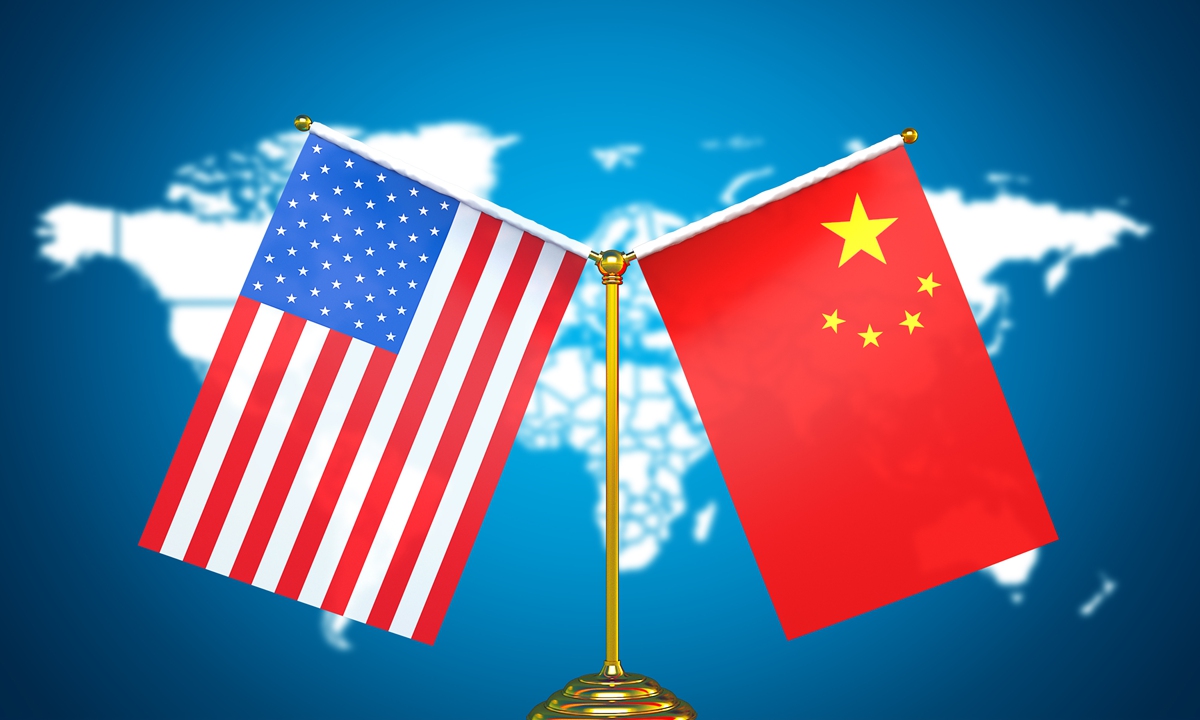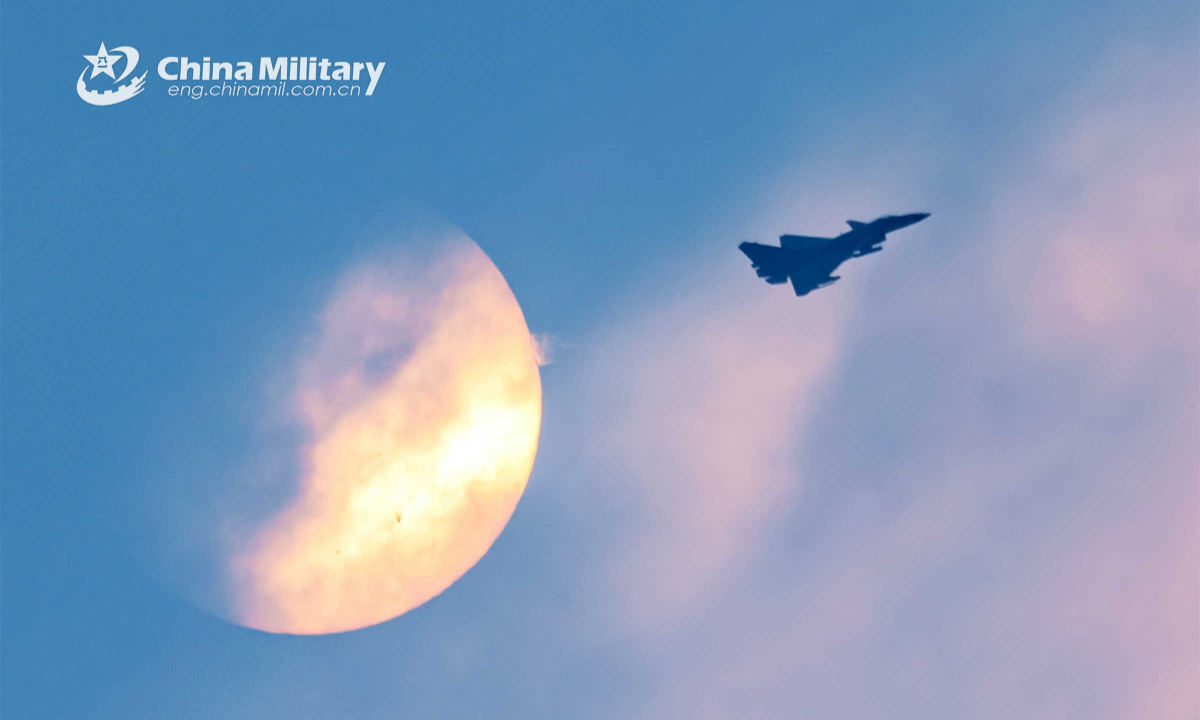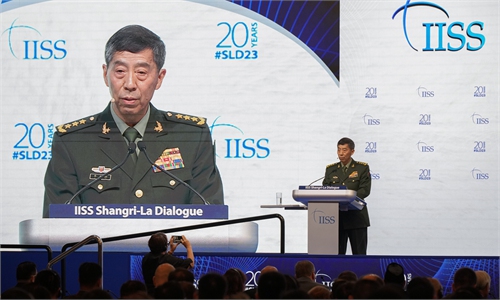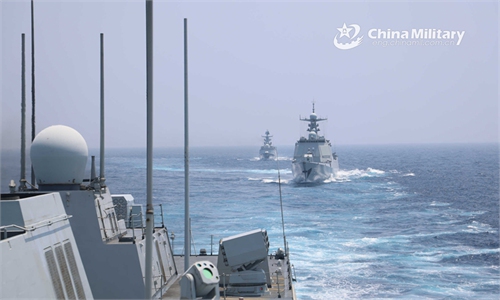Diplomats of China, US meet amid tense military standoff; 'bilateral ties enter a more complicated phase of game'

China US Photo: VCG
The recent interactions between senior Chinese and US officials are a contrast to the tit-for-tat actions and war of words between the two militaries over the Taiwan Straits and the South China Sea, which analysts said highlighted the fact that China and the US have entered a more complicated phase of the game - while China is willing to stabilize bilateral relations and is open to possible cooperation, it will also firmly fight back against the US' provocations.
On Monday, China's Vice Foreign Minister Ma Zhaoxu is scheduled to meet with the visiting US Assistant Secretary of State for East Asian and Pacific Affairs Daniel Kritenbrink. US national security official Sarah Beran will join Kritenbrink to "discuss key issues in the bilateral relationship" with the Chinese side, read a statement from the US State Department seen on Saturday.
Kritenbrink's trip follows China's top diplomat Wang Yi and US National Security Advisor Jake Sullivan's mid-May meeting in Vienna and China's Commerce Minister Wang Wentao's visit to Washington in late May.
While China and the US are having diplomatic re-engagement, the US continues to provoke China, leading to questions over its sincerity in improving ties, analysts said.
Military provocations
Though the Shangri-La Dialogue, where China and the US traded barbs, has concluded, the war of words prompted by US' provocations in the South China Sea and the Taiwan Straits continued on Monday.
It was the US that stirred up trouble and made provocations first, and China responded with measures in line with law and regulations, said Wang Wenbin, a spokesperson at China's Ministry of Foreign Affairs, at a regular press conference on Monday.
Wang's remarks came as the US continued to hype the Chinese People's Liberation Army's (PLA) handling of US and Canadian warships when they made a provocative transit through the Taiwan Straits on Saturday.
Senior Colonel Shi Yi, a spokesperson at the PLA Eastern Theater Command, said in a statement that the PLA Eastern Theater Command organized naval and aerial forces, tracked and monitored the vessels through the whole course, and handled the situation in accordance with law and regulations.

According to a statement released by the US Indo-Pacific Command after Shi's remarks, the Type 052D guided missile destroyer Suzhou of the PLA Navy carried out maneuvers in the vicinity of the US destroyer USS Chung-Hoon while the latter was making the transit in the Taiwan Straits, the website of the US Naval Institute reported on Sunday.
The US statement was accompanied by a video, showing the Chinese ship overtaking the US ship on the port side and crossing its bow.
"The Chinese military's measures are completely reasonable, lawful, safe and professional. It is the US that should deeply reflect on itself and correct its wrong deeds," Wang said.
The PLA destroyer's maneuver reminded observers of another recent incident, in which a PLA Air Force J-16 fighter jet intercepted a US RC-135 reconnaissance plane while the latter attempted to spy on the PLA Navy Shandong aircraft carrier group's routine training in the South China Sea on May 26.
If the US and other Western countries continue with similar provocations, corresponding countermeasures by the PLA will become more frequent, because China is unequivocal in safeguarding its national sovereignty, security and development interests, Song Zhongping, a Chinese military expert and TV commentator, told the Global Times on Monday.
Such countermeasures are also boosted by the PLA's rapid development in its weapons and equipment as well as high quality personnel training, Song said.
The US fears an accident of collision or crash and is attempting to shift the blame to China, but as long as the US continues to make provocations, the risk of such an incident will surely increase, Song warned.
On April 1, 2001, a PLA J-8II fighter jet collided with a US EP-3 spy plane in an intercept mission while the latter was on a close-in reconnaissance operation in the South China Sea above China's exclusive economic zone southeast of Hainan Island, causing the death of Chinese pilot Wang Wei and leading to an upheaval in China-US relations at the time.
China and the PLA are much more powerful than they were in 2001, and amid the current situation in China-US ties, the US cannot afford the consequences of another warplane or warship collision, observers said.
The US is bound to pay the price for provoking China's national security, and it must see China's determination, courage and capability in safeguarding its core interests, Song said.
"The US must think thrice, because if it dares to provoke further, it will definitely suffer major strategic failures," Song noted.
Seeking re-engagement
Chinese analysts pointed out that the responsibility for the current stalemate between China and the US lies with the US, and its hyping of "China's refusal to hold dialogue" is not helpful for improving relations, referring to US media claims that China refused a meeting between State Councilor and Defense Minister Li Shangfu and US Defense Secretary Lloyd Austin on the sidelines of the Shangri-La Dialogue.
The US has acted as if it is eager to engage with China and signals of "fine-tuning" were sent, this is because the US is considering how to compete with China safely while adhering to the general trend of strategic competition with China, Sun Chenghao, a fellow and head of US-EU program at Center for International Security and Strategy in Tsinghua University, told the Global Times on Monday.
Officials from the Biden administration also feel the tension of China-US relations and do not want to see a clash. They also understand that bilateral relations may get out of control if they continue to stress "competition," said Sun.
However, the window of opportunity left for the Biden administration to stabilize relations with China is closing, and after the US enters presidential election period next year, any change in policy related to China would be hit hard by the Republicans, said the expert.
Complaints from US allies and countries that have been dragged by the US into its competition with China are getting louder, pushing the US government to make some adjustments, said Sun, citing the narrative change from "de-coupling" to "de-risking" to appease its allies.
Many countries are becoming increasingly dissatisfied with the US' policy toward China as it has resulted in regional tensions, especially in the military field, and have expressed expectations of more engagement between China and the US and a stable global environment, analysts said.
There will be some positive signals for bilateral interactions and cooperation, Sun said, adding that visits to China by US Secretary of State Antony Blinken and other senior officials are possible.
However, analysts reached by the Global Times are generally not optimistic about China-US relations in the long term, as strategic competition with China has become a bipartisan consensus in the US.
Although the recent interactions between China and the US showed the two sides are trying to manage disputes, the risk of clashes will increase if the US does not stop its provocations and not show sincerity in improving relations, analysts said.
On Monday, China's Vice Foreign Minister Ma Zhaoxu is scheduled to meet with the visiting US Assistant Secretary of State for East Asian and Pacific Affairs Daniel Kritenbrink. US national security official Sarah Beran will join Kritenbrink to "discuss key issues in the bilateral relationship" with the Chinese side, read a statement from the US State Department seen on Saturday.
Kritenbrink's trip follows China's top diplomat Wang Yi and US National Security Advisor Jake Sullivan's mid-May meeting in Vienna and China's Commerce Minister Wang Wentao's visit to Washington in late May.
While China and the US are having diplomatic re-engagement, the US continues to provoke China, leading to questions over its sincerity in improving ties, analysts said.
Military provocations
Though the Shangri-La Dialogue, where China and the US traded barbs, has concluded, the war of words prompted by US' provocations in the South China Sea and the Taiwan Straits continued on Monday.
It was the US that stirred up trouble and made provocations first, and China responded with measures in line with law and regulations, said Wang Wenbin, a spokesperson at China's Ministry of Foreign Affairs, at a regular press conference on Monday.
Wang's remarks came as the US continued to hype the Chinese People's Liberation Army's (PLA) handling of US and Canadian warships when they made a provocative transit through the Taiwan Straits on Saturday.
Senior Colonel Shi Yi, a spokesperson at the PLA Eastern Theater Command, said in a statement that the PLA Eastern Theater Command organized naval and aerial forces, tracked and monitored the vessels through the whole course, and handled the situation in accordance with law and regulations.

Fighter jet attached to a brigade of the air force under the PLA Southern Theater Command flies by the rising moon during a round-the-clock flight training exercise in mid-May, 2023. Photo:China Military
According to a statement released by the US Indo-Pacific Command after Shi's remarks, the Type 052D guided missile destroyer Suzhou of the PLA Navy carried out maneuvers in the vicinity of the US destroyer USS Chung-Hoon while the latter was making the transit in the Taiwan Straits, the website of the US Naval Institute reported on Sunday.
The US statement was accompanied by a video, showing the Chinese ship overtaking the US ship on the port side and crossing its bow.
"The Chinese military's measures are completely reasonable, lawful, safe and professional. It is the US that should deeply reflect on itself and correct its wrong deeds," Wang said.
The PLA destroyer's maneuver reminded observers of another recent incident, in which a PLA Air Force J-16 fighter jet intercepted a US RC-135 reconnaissance plane while the latter attempted to spy on the PLA Navy Shandong aircraft carrier group's routine training in the South China Sea on May 26.
If the US and other Western countries continue with similar provocations, corresponding countermeasures by the PLA will become more frequent, because China is unequivocal in safeguarding its national sovereignty, security and development interests, Song Zhongping, a Chinese military expert and TV commentator, told the Global Times on Monday.
Such countermeasures are also boosted by the PLA's rapid development in its weapons and equipment as well as high quality personnel training, Song said.
The US fears an accident of collision or crash and is attempting to shift the blame to China, but as long as the US continues to make provocations, the risk of such an incident will surely increase, Song warned.
On April 1, 2001, a PLA J-8II fighter jet collided with a US EP-3 spy plane in an intercept mission while the latter was on a close-in reconnaissance operation in the South China Sea above China's exclusive economic zone southeast of Hainan Island, causing the death of Chinese pilot Wang Wei and leading to an upheaval in China-US relations at the time.
China and the PLA are much more powerful than they were in 2001, and amid the current situation in China-US ties, the US cannot afford the consequences of another warplane or warship collision, observers said.
The US is bound to pay the price for provoking China's national security, and it must see China's determination, courage and capability in safeguarding its core interests, Song said.
"The US must think thrice, because if it dares to provoke further, it will definitely suffer major strategic failures," Song noted.
Seeking re-engagement
Chinese analysts pointed out that the responsibility for the current stalemate between China and the US lies with the US, and its hyping of "China's refusal to hold dialogue" is not helpful for improving relations, referring to US media claims that China refused a meeting between State Councilor and Defense Minister Li Shangfu and US Defense Secretary Lloyd Austin on the sidelines of the Shangri-La Dialogue.
The US has acted as if it is eager to engage with China and signals of "fine-tuning" were sent, this is because the US is considering how to compete with China safely while adhering to the general trend of strategic competition with China, Sun Chenghao, a fellow and head of US-EU program at Center for International Security and Strategy in Tsinghua University, told the Global Times on Monday.
Officials from the Biden administration also feel the tension of China-US relations and do not want to see a clash. They also understand that bilateral relations may get out of control if they continue to stress "competition," said Sun.
However, the window of opportunity left for the Biden administration to stabilize relations with China is closing, and after the US enters presidential election period next year, any change in policy related to China would be hit hard by the Republicans, said the expert.
Complaints from US allies and countries that have been dragged by the US into its competition with China are getting louder, pushing the US government to make some adjustments, said Sun, citing the narrative change from "de-coupling" to "de-risking" to appease its allies.
Many countries are becoming increasingly dissatisfied with the US' policy toward China as it has resulted in regional tensions, especially in the military field, and have expressed expectations of more engagement between China and the US and a stable global environment, analysts said.
There will be some positive signals for bilateral interactions and cooperation, Sun said, adding that visits to China by US Secretary of State Antony Blinken and other senior officials are possible.
However, analysts reached by the Global Times are generally not optimistic about China-US relations in the long term, as strategic competition with China has become a bipartisan consensus in the US.
Although the recent interactions between China and the US showed the two sides are trying to manage disputes, the risk of clashes will increase if the US does not stop its provocations and not show sincerity in improving relations, analysts said.




